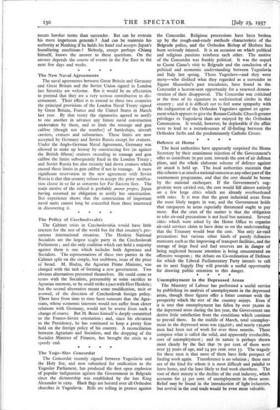The Policy of Czechoslovakia The Cabinet crisis in Czechoslovakia would
have little interest for the rest of the world but for that country's pre- carious international situation. The Henlein National Socialists are the largest siagle party in the Czechoslovak Parliament ; and the only coalition which can hold a majority against them is one which includes both Agrarians and Socialists. The representatives of these two parties in the Cabinet split on the simple, but stubborn, issue of the price of bread. M. Hodza, the Agrarian Prime Minister, was charged with the task of forming a new government. Two obvious alternatives presented themselves. He could come to terms with the Socialists, presumably at some sacrifice to Agrarian interests, or he could strike a pact with Herr Henlein; but the second alternative meant some modification, tacit or avowed, of the direction of Czechoslovak foreign policy. There have from time to time been rumours that the Agra- rians, whose economic interests would not suffer from closer relations with Germany, would not be averse from such a change of course. But M. Benes himself is deeply committed to the Franco-Soviet orientation ; and, since his elevation to the Presidency, he has continued to keep a pretty firm hold on the foreign policy of his country. A reconciliation between Agrarians and Socialists, and the dropping of the Socialist Minister of Finance, has brought the crisis to a speedy end.
* * * *






























































 Previous page
Previous page